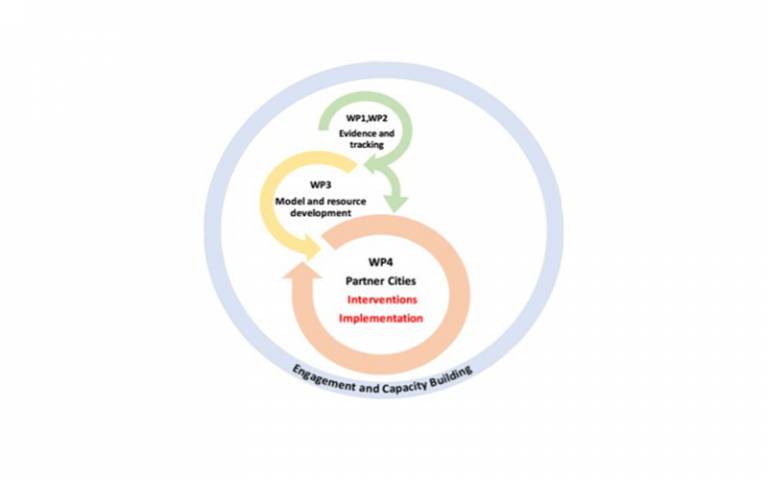Find out more about the Complex Urban Systems for Sustainability and Health research project.
What is CUSSH?
In the CUSSH project we will:
- Articulate the opportunities for achieving major health and sustainability objectives through urban development
- Use research evidence to inform decision-makers and the public about the pathways of development that provide the greatest opportunities for health and sustainability, and to track progress towards the fulfilment of agreed goals
- Identify the methods and factors crucial to successful implementation of development strategies that take full account of the needs and opportunities for health and sustainability in urban living
- Read more about the project
Our transdisciplinary research will address the unprecedented constellation of changes affecting urban environments as complex systems and threatening future progress, including population growth and movement, climate change and natural disaster risks, declining natural resources, environmental pollution, emerging diseases and inequalities.
The transformative changes crucial to address these challenges go well beyond actions so far achieved by any city. For higher income settings they include: the complete de-carbonization of all main energy sources; the replacement of fossil fuels as the energy carrier for ground transportation combined with a quantum shift in travel behaviour; dramatic improvements in the energy efficiency of housing, commercial buildings and industrial processes; and adaptations to infrastructure and support systems to improve resilience to current and evolving environmental threats such as extreme heat, flood risks, and the spread of vector-borne disease.
Particularly in low- and middle-income settings, additional actions include improvement in access to basic services and infrastructure, and profound reduction of household and community environmental exposures, including those relating to air pollution, unsafe water and physical security. Combining context specific interventions that address the range of challenges offers unparalleled opportunities for population health and sustainability.
In this project we aim to develop system-wide understanding of how those opportunities can be realised through development and implementation of evidence-informed solutions in areas such as energy provision, transport infrastructure and operation, green infrastructure, health systems, housing and water and sanitation.
- Aim
To conduct research and improve capacity to guide transformational changes in cities to meet environmental imperatives and improve the health and wellbeing of current and future populations by harnessing the benefits of sustainable policies and minimizing potential adverse consequences of global technological, environmental and social change.
Specifically, we will test the degree to which the use of scientific evidence and participatory engagement in decision processes can strengthen the envisioning, formulation and implementation of transformational health and sustainability policies in the context of unprecedented need and opportunity for improving the health of populations and natural systems.
- Objectives
- To review potential solutions for healthy sustainable urban development which addresses the roles of technological innovation, city governance, financing mechanisms, infrastructure and behaviour change.
- To establish methods for tracking and evaluation of the progress towards city-specific sustainability and health goals, and for comparing the impact of city development trajectories.
- To develop and apply models of impact on population health, health inequalities, and socioeconomic and environmental parameters of alternative urban development pathways.
- To use participatory methods to undertake iterative engagements with stakeholders in selected partner cities in order to evaluate and understand processes to help implement the transformative changes needed to meet local and global health and sustainability objectives.
- To develop a programme of public engagement and capacity building to ensure wide participation in the development (‘co-creation’) and use of research evidence by decision- makers and other stakeholders to help ensure environmental and health objectives receive appropriate weight in public policy.
- Methods
The work programme, focused on solutions, has four principal work packages (WPs) corresponding to objectives1-4 and a cross-cutting engagement component corresponding to objective 5 (see Figure).

- Work packages
WPs 1, 2 & 3 provide the underpinning evidence and resources (models, tools) to support the translation of evidence into policy and practice based on principles of sustainable development, and the formulation and development of specific solutions to achieve transformative change.
In WP 4 the translation into action (i.e. to develop and implement city intervention plans) will be tested through intensive engagement with our partner cities, informed by the evidence of WPs 1-3, and using qualitative methods to understand opportunities, levers and barriers, and to strengthen capacity to implement transformative change. The project will entail several strands of evaluation, each elaborated under individual work packages below. They include:
Quantitative tracking over time of changes in relevant indicators of policy drivers and outcomes (WP2) Observation of the process of engagement, evidence presentation, decision-making and implementation (WP4) Documentation of wider engagement activities, including the engagement process itself, as a model for replication and the development of distributed transdisciplinary collaborations and research uptake by other cities.
Partner cities
- London (UK)
- Rennes (France)
- Beijing and Ningbo (China)
- Nairobi and Kisumu (Kenya)
 Close
Close

